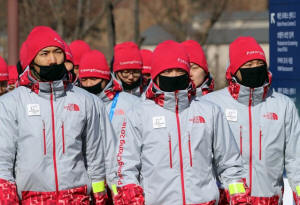|
Athletes, organizers locked in Pyeongchang cold war
 Send a link to a friend
Send a link to a friend
 [February 07, 2018]
By Peter Rutherford [February 07, 2018]
By Peter Rutherford
PYEONGCHANG (Reuters) - Even for cold
weather warriors hardened by years of winter sports training, the
icy chill of South Korea's frigid February has come as a shock to
the system in the leadup to this month's Pyeongchang Olympics.
Plunging to minus 20 degrees Celsius (-4 Fahrenheit) at night and
rarely breaking above freezing in the day, the temperatures have put
Pyeongchang on track to be the coldest Olympics in decades and
present athletes with a very different set of conditions from the
sunshine and slushy snow of Sochi four years ago.
The 1994 Winter Games in Lillehammer, Norway, where temperatures
dipped to minus 11 Celsius, are currently the coldest Olympics on
record but recent Games in Turin, Vancouver and Sochi have all been
significantly warmer.
Sporting and digital equipment appears no match for the biting cold
either, with skis warped to such an extent coaches are tossing them
out like "garbage" while cellphone and TV camera batteries are being
rendered lifeless in minutes.
Austrian Alpine skier Marcel Hirscher said athletes were using a
different pair of skis on every run as the frigid temperatures
sharpened snow crystals.

"Snow crystals get really sharp when temperatures go to minus 20
degrees and the base burns," he added.
"It's the same as lighting a fire and burning your (ski) base
because the snow crystals get such sharp edges."
Health concerns too have risen to the fore.
Norway's cross-country team have brought some of their training
indoors to prevent cold air from damaging athletes' airways while
fears that an outbreak of norovirus, known as the 'winter vomiting
bug', would sweep through the Games prompted organizers to keep
infected security staff away from work.
But it is the threat of hypothermia at Friday's opening ceremony
that has set organizers on edge, with presidents, prime ministers
and some 35,000 spectators scheduled to gather under the stars at
Pyeongchang's $58 million open-air Olympic stadium.
The ceremony has been slimmed down to a brisk two-hour march from
the typical four-hour procession and organizers plan to dish out
hats, blankets and seat-warmers to combat the cold, though that has
not been enough to reassure some spectators as a number of tickets
have already been returned.
Sadie Bjornsen, a cross-country skier on Team USA, told Reuters they
were taking the cold threat seriously.
"We've got these heated jackets from Ralph Lauren, and we've also
been told that there's going to be a warm area that we can stand
in," she said. "After it's over it's about getting back on the bus
as quickly as possible."
'PYEONGCHANG COLD'
The Korean Meteorological Administration (KMA) may just have
provided a ray of sunshine for organizers on Wednesday, however.
"According to our forecast the temperature will not be problematic
to have the opening ceremony," KMA Deputy Director Choi Heung-jin
told reporters.
[to top of second column] |

Volunteers protect their faces from the cold at the Olympic stadium
of the Pyeongchang Winter Olympic Games in Pyeongchang, South Korea
February 7, 2018. REUTERS/Eric Gaillard

Temperatures would range from minus 2 to minus 5 Celsius (28.4-23 F)
which would not be overly concerning, he added.
Yoon Hee-dong, director of the KMA's forecast bureau, said
spectators coming to Gangwon province should realize that it was
colder than other parts of Korea and that they should "bundle up"
and take other precautions to keep the cold at bay.
A hardy construction worker at the media center in Pyeongchang,
layered up with only his eyes and nose exposed to the elements, said
the cold was "different" here.
"This is not Seoul," he said. "This is Pyeongchang cold."
The current cold snap is the latest to blanket the country over the
past few months, prompting the Korea Centers for Disease Control and
Prevention to issue warnings about cold weather injuries such as
hypothermia and frostbite.
Not everyone is praying for the sweet release of spring, however,
with manufacturers and retailers of cold weather gear enjoying
something of a boon.
Sales of hot packs, which generate heat for hours when activated
through shaking, have skyrocketed, creating shortages of materials
for manufacturers, Yonhap News reported last week.
"In December, securing iron powder was a bit difficult," an official
from TPG told Reuters, adding that while supplies had since
stabilized the outlook was uncertain. "Lately demand has been
growing because of the Olympics so we will have to see."
North Korea has agreed to participate at the Games amid a thaw in
relations with the South, and the cold does not seem to be anything
out of the ordinary for their delegation.

"I donít know whether it's cold because I'm from North Korea," Vice
Sports Minister Won Gil-woo, who led the North's delegation to the
Games, told reporters.
"Pyeongchang weather is good."
(Additional reporting by Philip O'Connor, Haeijn Choi and Jane
Chung; Editing by Mark Bendeich)
[© 2018 Thomson Reuters. All rights
reserved.] Copyright 2018 Reuters. All rights reserved. This material may not be published,
broadcast, rewritten or redistributed.
Thompson Reuters is solely responsible for this content. |